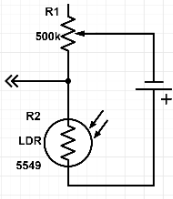💬 Multi-Sensor: Temp/Humidity/PIR/ Leak/Magnet/Light/Accel
-
I uploaded new, upgraded demo code. It's tested and works. :)
SUMMARY: The demo sketch runs on MultiSensor Version 7 board with an I2C Si7021 module to transmit temperature, humidity, and battery voltage to a MySensors gateway using MySensors protocols.
-
Actually, this contraption looks even more promising than the ball switch: https://www.aliexpress.com/item/Vibration-Switch-Shock-Vibration-Sensor-Shaked-Switch-Shaked-Stick-Skates/32686838884.html?ws_ab_test=searchweb0_0,searchweb201602_4_10152_10065_10151_10344_10068_10130_10345_10324_10342_10547_10325_10343_10546_10340_10341_10548_10545_10541_10562_10084_10083_10307_10178_10060_10155_10154_10539_10312_10059_10313_10314_10534_10533_100031_10103_10073_10594_10557_10558_10596_10595_10142_10107,searchweb201603_25,ppcSwitch_4&btsid=8ee4bf46-c3de-4f6a-b23f-32b800aefc7a&algo_expid=d469a8ff-4dce-4442-8590-0e2fdefb1f4b-14&algo_pvid=d469a8ff-4dce-4442-8590-0e2fdefb1f4b&rmStoreLevelAB=0
-
@NeverDie have you seen the comments ? :D
Damn thing works only for the impact of accelerations> 50g. and only in one direction. In life it is not applicable. Shit, shorter. -
Thinking about it more now, I think the ball switch will definitely work if I position it with a vertical orientation, because they invariably fully invert the trash/recycling bin in order to empty it.
-
Here's a node with the Hall sensor installed:
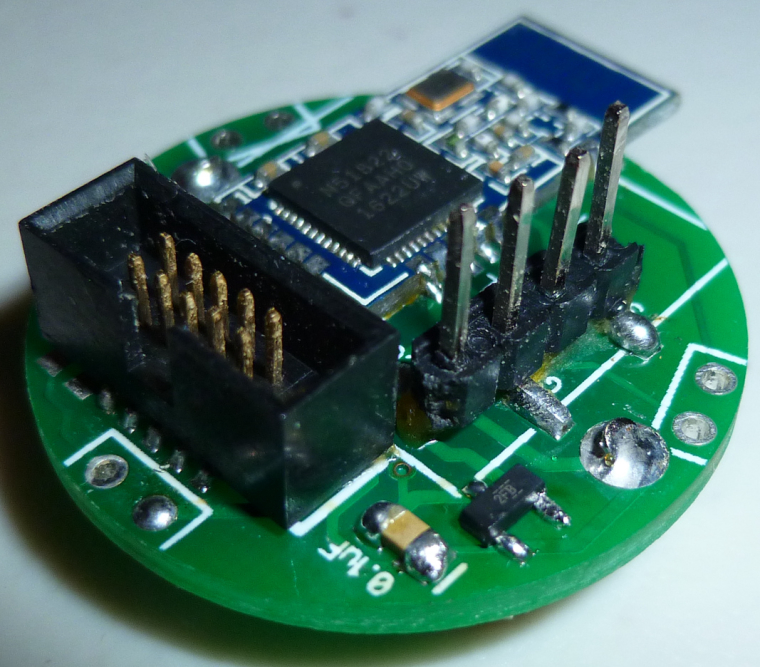
I'll probably be testing it later today. -
Tested. The Hall sensor works. Basically, if you run this code:
#define HALL_PIN 9 hwPinMode(HALL_PIN, INPUT); while (true) { if (digitalRead(HALL_PIN)) { digitalWrite(LED_BUILTIN,LOW); } else { digitalWrite(LED_BUILTIN,HIGH); } }then the LED will turn-on when you bring a magnet near the sensor, and the LED will turn-off when you move the magnet away. Simple. :)
-
@NeverDie
Did you or anybody else could write to the NRF5xxx via the Arduino IDE and a ST-Link V2 programmer?
I find the DK for approx. 32€ a little bit to expensive for just testing.Edit: Maybe this one could work:
http://s.aliexpress.com/FRzU3miMThanks.
-
@NeverDie
Did you or anybody else could write to the NRF5xxx via the Arduino IDE and a ST-Link V2 programmer?
I find the DK for approx. 32€ a little bit to expensive for just testing.Edit: Maybe this one could work:
http://s.aliexpress.com/FRzU3miMThanks.
@DerManni said in 💬 Multi-Sensor: Temp/Humidity/PIR/ Leak/Magnet/Light/Accel:
ST-Link V2 programmer
Not me. As I said, I'm using the nRF52 DK as my programmer of choice. I think others may be using the ST-Link V2. Not 100% sure though.
-
@DerManni said in 💬 Multi-Sensor: Temp/Humidity/PIR/ Leak/Magnet/Light/Accel:
ST-Link V2 programmer
Not me. As I said, I'm using the nRF52 DK as my programmer of choice. I think others may be using the ST-Link V2. Not 100% sure though.
-
@rmtucker Could you please explain in weich was you connect the STLINK to the NRF Module to usw the Arduino IDE. Thanks
-
I received the version 9 PCB's today. Here's one assembled as a minimalist water leak sensor:
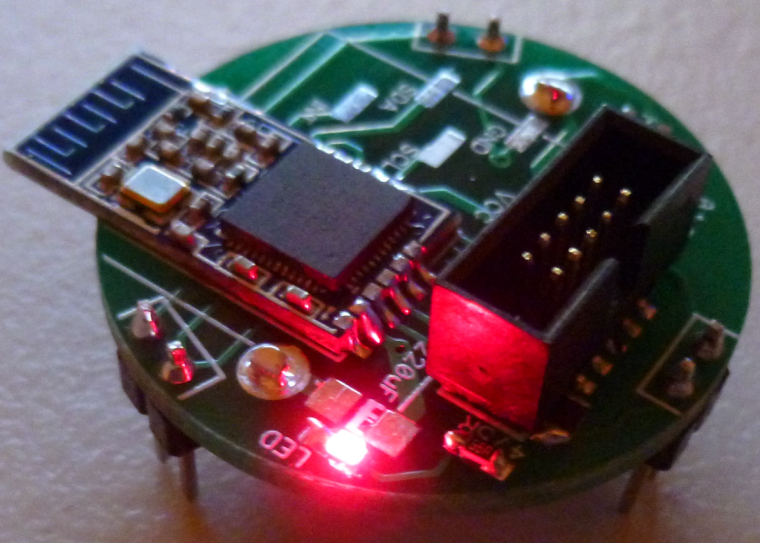
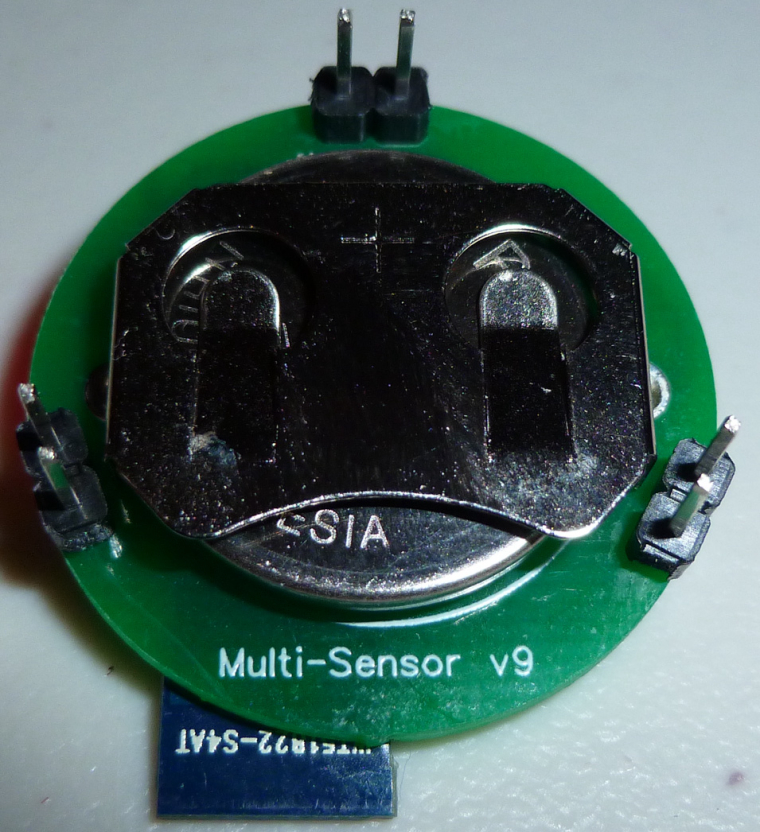
There's now enough physical clearance between the male header leak detection pins and the CR2032 battery holder that I feel comfortable declaring the hardware as finished. :)
-
@Nca78 said in 💬 CR2032 Small Wireless Temperature-Humidity Sensor:
Also, what about moving the led to the center next to its resistor, it would leave enough space to squeeze in a SOT 23 ultra low power hall sensor and it's 100nF capacitor.
Yes, with the Version 4 design serving as the basis, I think there will be enough room to do this.
I'd also like to add a light sensor of some kind: something that will trigger an interrupt when, say, a refrigerator light goes on or off (for the case where the temperature node is in a refrigertor or freezer). Do you have any particular suggestions for that? A simple photoresistor, or would there be something better (lower current)?

@NeverDie said in 💬 Multi-Sensor: Temp/Humidity/PIR/ Leak/Magnet/Light/Accel:
@Nca78 said in 💬 CR2032 Small Wireless Temperature-Humidity Sensor:
Also, what about moving the led to the center next to its resistor, it would leave enough space to squeeze in a SOT 23 ultra low power hall sensor and it's 100nF capacitor.
Yes, with the Version 4 design serving as the basis, I think there will be enough room to do this.
I'd also like to add a light sensor of some kind: something that will trigger an interrupt when, say, a refrigerator light goes on or off (for the case where the temperature node is in a refrigertor or freezer). Do you have any particular suggestions for that? A simple photoresistor, or would there be something better (lower current)?

A photoresistor turns out to work just fine for binary detection of whether a light is on or off:
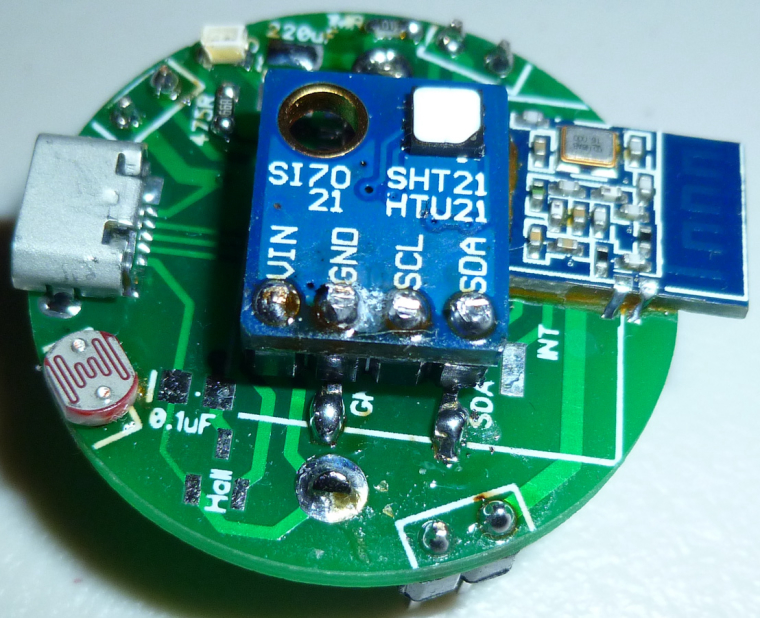
I put it in one of the header pin hole pairs otherwise reserved for the leak detection pins and then ran the leak detection sketch. When a light goes on, the resistance of the photoresistor goes from about 20 megaohms in the dark down to well under 100K ohms (exactly amount depends on the light intensity) in the light. So, under light stimulus the photoresistor behaves essentially the same as leak detection pins which have come into contact with water. :)The one I used is this: https://www.digikey.com/product-detail/en/luna-optoelectronics/NSL-19M51/NSL-19M51-ND/5039794 Perhaps a cheaper photoresistor would have worked just as well, but for proof of concept prototyping I wanted to try this one, which had desirable specs.
-
@NeverDie said in 💬 Multi-Sensor: Temp/Humidity/PIR/ Leak/Magnet/Light/Accel:
@Nca78 said in 💬 CR2032 Small Wireless Temperature-Humidity Sensor:
Also, what about moving the led to the center next to its resistor, it would leave enough space to squeeze in a SOT 23 ultra low power hall sensor and it's 100nF capacitor.
Yes, with the Version 4 design serving as the basis, I think there will be enough room to do this.
I'd also like to add a light sensor of some kind: something that will trigger an interrupt when, say, a refrigerator light goes on or off (for the case where the temperature node is in a refrigertor or freezer). Do you have any particular suggestions for that? A simple photoresistor, or would there be something better (lower current)?

A photoresistor turns out to work just fine for binary detection of whether a light is on or off:

I put it in one of the header pin hole pairs otherwise reserved for the leak detection pins and then ran the leak detection sketch. When a light goes on, the resistance of the photoresistor goes from about 20 megaohms in the dark down to well under 100K ohms (exactly amount depends on the light intensity) in the light. So, under light stimulus the photoresistor behaves essentially the same as leak detection pins which have come into contact with water. :)The one I used is this: https://www.digikey.com/product-detail/en/luna-optoelectronics/NSL-19M51/NSL-19M51-ND/5039794 Perhaps a cheaper photoresistor would have worked just as well, but for proof of concept prototyping I wanted to try this one, which had desirable specs.
@NeverDie It appears that photoresistors of type 5539 and/or 5549 may work as well: https://www.aliexpress.com/item/Free-shipping-20pcs-5549-light-dependent-resistor-photoresistor-resistor-5mm-photosensitive-resistance-35513/32346773727.html?ws_ab_test=searchweb0_0,searchweb201602_4_10152_10065_5000015_10151_10344_10068_10130_10345_10324_10342_10547_10325_10343_10546_10340_10341_10548_10545_5130015_10541_10084_10083_10307_5690015_10539_5080015_10312_10059_10313_10314_10534_100031_10604_10603_10103_10605_5060015_10596_10142_10107,searchweb201603_12,ppcSwitch_4&algo_expid=14488cca-cb1a-4d45-b8d2-d8b444735f2a-16&algo_pvid=14488cca-cb1a-4d45-b8d2-d8b444735f2a&rmStoreLevelAB=2
-
@NeverDie It appears that photoresistors of type 5539 and/or 5549 may work as well: https://www.aliexpress.com/item/Free-shipping-20pcs-5549-light-dependent-resistor-photoresistor-resistor-5mm-photosensitive-resistance-35513/32346773727.html?ws_ab_test=searchweb0_0,searchweb201602_4_10152_10065_5000015_10151_10344_10068_10130_10345_10324_10342_10547_10325_10343_10546_10340_10341_10548_10545_5130015_10541_10084_10083_10307_5690015_10539_5080015_10312_10059_10313_10314_10534_100031_10604_10603_10103_10605_5060015_10596_10142_10107,searchweb201603_12,ppcSwitch_4&algo_expid=14488cca-cb1a-4d45-b8d2-d8b444735f2a-16&algo_pvid=14488cca-cb1a-4d45-b8d2-d8b444735f2a&rmStoreLevelAB=2
-
@Nca78 said in 💬 Multi-Sensor: Temp/Humidity/PIR/ Leak/Magnet/Light/Accel:
@NeverDie and what is your approximative power consumption with the photoresistor ?
With the photoresistor installed, current consumption for the entire node measures out at 4ua in the dark and 7.2ua in full saturation brightness. That compares to 3.9ua current consumption for the node with no photoresistor installed.
I'm still waiting for the I2C light sensor to arrive. However, as these photoresistors cost only a little more than 2 cents each for a pack of 50 (see above Aliexpress link), I think they're a reasonable choice for a refrigerator app, where it's going to be completely dark most of the time anyway.
-
@Nca78 said in 💬 Multi-Sensor: Temp/Humidity/PIR/ Leak/Magnet/Light/Accel:
@NeverDie and what is your approximative power consumption with the photoresistor ?
With the photoresistor installed, current consumption for the entire node measures out at 4ua in the dark and 7.2ua in full saturation brightness. That compares to 3.9ua current consumption for the node with no photoresistor installed.
I'm still waiting for the I2C light sensor to arrive. However, as these photoresistors cost only a little more than 2 cents each for a pack of 50 (see above Aliexpress link), I think they're a reasonable choice for a refrigerator app, where it's going to be completely dark most of the time anyway.
@NeverDie said in 💬 Multi-Sensor: Temp/Humidity/PIR/ Leak/Magnet/Light/Accel:
I'm still waiting for the I2C light sensor to arrive. However, as these photoresistors cost only a little more than 2 cents each for a pack of 50 (see above Aliexpress link), I think they're a reasonable choice for a refrigerator app, where it's going to be completely dark most of the time anyway.
Yes it's nearly not changing the consumption in sleep so if you have only a basic use for dark/light it's a waste to use an i2c sensor, which will use more energy most of the time.

